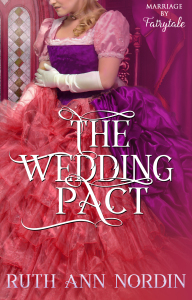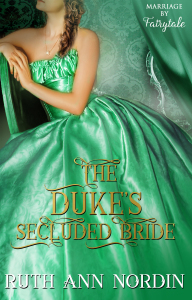Ruth Ann Nordin's Blog, page 23
April 30, 2021
There Can Only Be One (A Post for Writers Who Are Writing for Passion)
Over the past month, an author friend and I have been exchanging music videos on You Tube that inspire us while we’re writing our books. She knows quite a few independent musicians that I had no idea were out there, and I really enjoyed getting exposed to a variety of new music. For An Earl In Time, I found one particular group she found to be instrumental in setting the mood that I needed in order to finish the book. I’m suspect a lot of writers out there use music to get them into the world they are writing
In this case, this is the only music group that could deliver on exactly what I was looking for. Their stuff is different. It’s not stuff you’ll find on the radio. Other music groups come close, but they just can’t quite make the mark. This group writes their own music and lyrics. They create their own videos. They upload their songs across multiple platforms for sale. This is an indie music group. No one can duplicate what they are doing. They have a style and sound that is uniquely theirs. In other words, this group is irreplaceable to me.
And this brings me to this subject of this post.
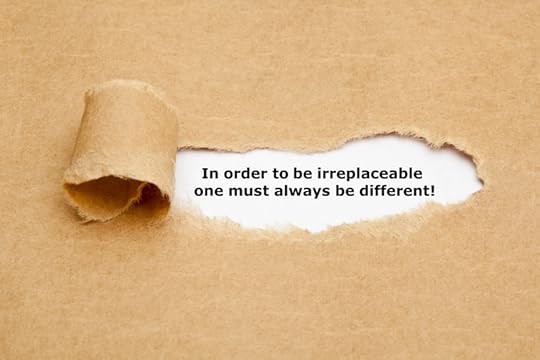 ID 101423388 © Ivelinr | Dreamstime.com
ID 101423388 © Ivelinr | Dreamstime.comThe benefit of a creative endeavor is that it’s fully dependent on the person who is creating it. You can decide what kind of product you will produce.
Anyone can tell a story that hits main plot points. Anyone can target popular tropes and trends. Anyone can follow the “formula” of storytelling. You can plug in all of the structural components and have a commercially viable story. That’s what a lot of writers who are writing for money do. They just put things into the “formula” and produce a story. These books are a dime a dozen. They’re all over the place. I’ve read some of them, and they sound the same. It’s obvious to me that their books meant nothing to them on a personal level when they wrote them. I understand that these can make good money, but that’s largely because of the subscription model.
The reason subscription services do so well is because the content is consumed and tossed out. Subscribers aren’t keeping your books. But I get it. The reason why these writers write books is for money. They aren’t interested in being on someone’s shelf for a lifetime. They don’t care if someone reads their books over and over, nor are they interested in writing something that will touch someone on a deep emotional level. This is all for the here and now. We’re in an instant gratification world. We want our reward, and we want it right now. Hence their mindset and why they write what they do.
If you are irreplaceable (meaning your stories are distinctly you), you will create books that people will want to keep. You know what I did with that group I found on You Tube? I went to iTunes and bought their songs. I burned their music on a CD. That way I get to keep those songs forever. The reason I did that is because they have impacted me on an emotional level. Books can have the same impact.
To create anything of lasting worth, a writer needs passion. The best books take readers on an adventure they’ll want to read more than once. Exceptional books have layers that will allow readers to pick out new things when they read a second or even a third time. Writing at the deeper level is art in its purest form, and art requires emotional commitment to the story one is writing.
The greatest contribution writers can bring to the story is the writer themselves. No one else can tell the story the way the writer will if that writer is fully invested in the story. Don’t be afraid to merge in aspects of your past, your personality, and your values to the stories you write. The mix of these three elements is what makes the things you produce different from what others are doing. It’s also going to ensure you’re passionate about what you’re doing. You can fake many things, but passion isn’t one of them. The stuff you’re fired up about is going to bleed off the page.
Writers who are passionate about their work might not write books that are the biggest sellers, but these are books that resonate most with the readers who enjoy them. These books will have their critics. Every creative venture ends up with critics. That’s the nature of writing. You simply can’t please everyone because, eventually, you’ll come across someone who has a completely different set of likes and dislikes than you do. This is why you can’t take criticism personally. I know that’s easier said than done, but it’s true. Take a look at the 1 and 2-star reviews on your favorite books. Music and movies get their share of criticism, too. Criticism is all over the place. And it only seems to be getting worse in an era of social media where people feel at liberty to tear others down. If you reach enough readers, you will get some hate.
But does receiving criticism mean you should give up writing what you’re passionate about? Of course not. I guarantee you that there will be people who will absolutely adore your work and will want more of it. There is a reason you attract certain people but not others. The people who enjoy your books are the ones you should focus on. Forget the haters. They don’t count. Only you can write your books with the enthusiasm necessary for you to connect with your readers. No other author will be able to do that. That’s because there can only be one you. Just like a fingerprint and DNA, you can’t be replaced. You can’t be duplicated.
Embracing that aspect of yourself can be very freeing when it comes to getting maximum enjoyment from your writing. It’ll also free you up to write the books that will have the greatest impact on those who love them. Books have the opportunity to touch someone’s life in a meaningful way. Think of it. You have the power to give something lasting to another person in a way no other author can. You have no idea who that person is or how many are out there. All you can do is write the story. The rest is up to God.
I don’t believe in coincidences. We live in an age where we have the means to write and publish our own books without the permission of a publisher. There’s a reason for this. We have an opportunity. Let’s not waste it. Give everything you are to your stories. When the day comes when you’re no longer here, who knows if your books will continue to find new readers? Granted, a lot of books will fall into oblivion, but you might write a book that will be passed down from one generation to another. I doubt authors like Charles Dickens, Jane Austen, or Edgar Allen Poe thought we’d still have their books around today. Maybe a century from now, your name will be along with theirs.
So give this your all. Be irreplaceable. Be you. And most of all, have fun while you’re doing it. 
April 27, 2021
A Most Unsuitable Earl Trivia
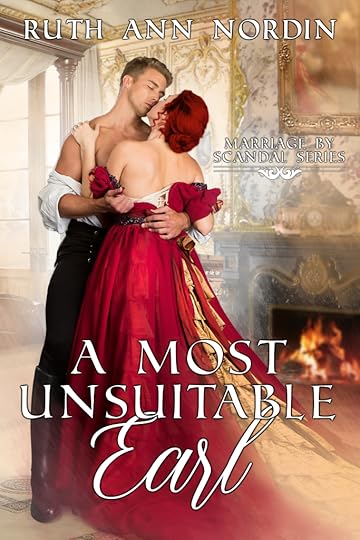 Ethan (Lord Edon)’s book!
Ethan (Lord Edon)’s book!The idea for this book came me when I was writing the beginning of The Earl’s Inconvenient Wife. It was in this snippet:
The duke pointed in the direction of a young lady dancing with her partner. Nate tried to determine whether she was interested in the gentleman she was currently dancing with or not. She was smiling and seemed to be talking amiably to him.
“Isn’t that Lord Edon she’s dancing with?” Nate asked.
Rumsey frowned. “Hopefully not for long. His most notable accomplishments are gambling and women of ill repute. I fear he’s taken an interest in her dowry.”
At that point, I knew Rumsey’s daughter would end up with Ethan. What I didn’t know was how much I’d enjoy writing Ethan. After all this time, Ethan and his friend, Christopher Robinson, are my favorite two Regency characters.
***
This is the original cover:
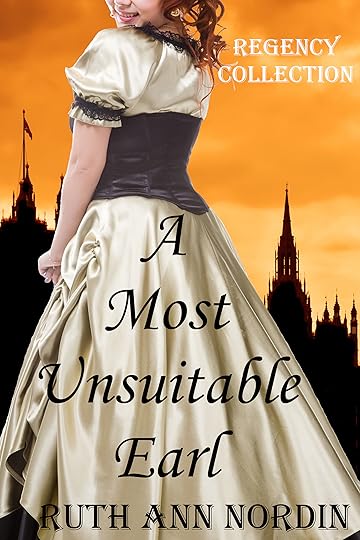
When I decided to give my entire backlist a “face lift”, this book was one of them. (As you can see by the “Regency Collection” series title, my original intention was to write only a few Regencies.) At last count, I have completed 31 Regencies (2 of which are completed but haven’t been published yet).
***
I like Ethan’s mother. Her role was meant to be comical, but some people find her annoying. This is why I say that I have a weird sense of humor. Some people really hate it. They find it immature. No need to keep sending me messages letting me know how immature my humor is. I’m already aware of it. I grew up on Mel Brooks who did parodies. I enjoy movies that are parodies. Yes, they’re stupid, but they’re hilarious, too. I also enjoy “I Love Lucy”. That is my favorite TV show of all time, and Lucy got into a lot of trouble through the situations she put herself in. All of this influences my humor. It had a hand in the relationship between Ethan and his mother.
***
When I wrote this book, just about every single Regency out there I came across had a rake in it. I thought, “Wouldn’t it be neat if the hero was only pretending to be a rake?” And that’s how Ethan was born.
As a side note:
The whole “rake” thing in Regencies and the “hero who sowed his wild oats” theme in historical westerns is exactly why I started writing romances to begin with. I was tired of the experienced hero and virgin heroine theme that kept popping up. On the other end of the spectrum were the super squeaky clean romances which had the passion of a rock in them. I loved reading romances, but something had to change. After searching bookstores and talking to the employees who couldn’t help me find the books I was looking for, I ended up writing them myself.
***
Ethan needed a heroine who could complement him. While he was outwardly a rake, he was inwardly prudish. I did not go into the book expecting that, but as I wrote the story, that is how his character developed. So I needed to balance this out. That is why Catherine ended up being a wallflower who was secretly a seductress. I thought it would be fascinating to work with two people who were opposites. She allowed him to be the person he truly was, and he allowed her to be the person she truly was.
***
This part always cracks me up and is a good example of my weird sense of humor:
“Just what I need for a son-in-law,” Catherine’s father muttered. “He’s nothing but a pansy.”
At that, Ethan’s eyes flew open and he eased into an upright position. “I am not a pansy!”
“Of course, you’re not, my dear,” his mother replied as she hurried over to him and wiped the sweat off his forehead with a handkerchief.
Even though Ethan’s mother drives him crazy, he loves her, and he knows she has his best interest at heart. That’s why he lives in the same house with her and takes care of her.
***
In this book, Catherine’s father didn’t approve of Ethan. As I continued to write Regencies, that ended up changing. I can’t remember what book it’s in, but I have a part where I reference that her father paid Ethan a compliment (or something along those lines) and it shocked Ethan. I wish I could remember what book that was in. But yes, after years of terrorizing Ethan, her father finally grew to like him. Much to Ethan’s relief, he no longer has to worry about being invited over for “fencing”. 
***
While Ethan promised to never gamble again, later books reveal he didn’t keep this promise if he was sure he’d win. He even joined the bet in Taming the Viscountess, and this was the one time he actually lost.
***
The scene where Ethan and Catherine are at the circus is also in Her Counterfeit Husband when Jason is trying to figure out the truth about his past. I wrote Her Counterfeit Husband before I wrote A Most Unsuitable Earl, and I was looking for a way to mix the characters into the same world without them being aware of each other.
***
In this book, Ethan is reading “The Rime of the Ancient Mariner” in Lyrical Ballads, With a Few Other Poems. I read this book twice in high school (in two different schools since I was in Ohio up until my senior year; I moved to Florida my senior year). In a college, I had a teacher who used to quote from this story quite a bit. He would say, “Water, water, everywhere, and all the boards did shrink; water, water, everywhere, nor any drop to drink.” I can quote that off the top of my head because of him. I actually enjoyed this story, and to this day, it’s one of my favorites, though it’s far from being a romance.
April 23, 2021
No Job is 100% Secure, and This Goes for Writing, Too
Today’s post is inspired by this video via the Dave Ramsey show:
As a quick disclaimer, I realize not everyone can make money doing what they’re passionate about.
With that aside, let’s get to the post.
Passion AND write-to-market writers can suffer from a loss of income.The vision that the marketing gurus will sell writers is that writing to market is a secure way of making money. This is a myth. Does it happen to some writers? Of course, it does. However, writers have also made money writing books they are passionate about. I know this because I’m one of them. Granted, the amount of money I’ve been making has decreased since 2015, but I’m fortunate to still make something. And guess what? Recently, I read a book where an author who embraces the writing-to-market approach is making less money, too.
What does this mean?
It means that regardless of whether you write for passion or write to market, you do NOT have a secure source of income.
What I’ve noticed over the years is that writers who embrace passion over writing to market understand this better because the expectation when writing for passion is that you might not make money. The expectation when writing to market is that you will make money. And just because you can market well, it doesn’t mean you’ll always be raking in the money. I’ve come across writers who have plugged in the tried-and-true marketing strategies outlined by the indie community, and sadly, they didn’t make much money. That’s why so many writers end up disillusioned and quit.
Also, don’t assume that if you manage to make good money writing stuff to market you’ll be happy. What if you pick something you don’t like just because it’s popular? What if that paid off, but now you’re hating it? What if this is your only source of income? What if you end up feeling trapped?
I know of an author who writes a genre she absolutely hates. You see, early on, she decided to pick a genre she didn’t care for because it was hot. This was due to the “write to market” advice she received. The advice worked. She’s making a living at it. But the thing is, she HATES writing now. She cries because she is trapped. Now, I don’t know if she would have been able to build up a following and make a living if she had written in a genre she enjoys. No one can know that because we can’t go back in time to find out. She wishes she could write something else but is too afraid to do so since it’s hard to start over. She feels that the stuff she is writing now is “secure”. So she is determined to keep on with it.
I sympathize with her plight, but I wouldn’t wish this experience on anyone. There’s nothing worse than having a soul-sucking job that makes you miserable. If you are tempted to write something you hate, I urge you to carefully think it over. Remember, job security is a myth.
Changes in the indie publishing landscape will impact income potential.In writing, you’re going to have obstacles, regardless of whether you’re writing for passion or writing to market.
First, you’re dealing with the fact that it’s harder to get visibility because the amount of books available exceeds the amount of people who will buy them. This is a simple supply and demand issue. The higher the supply, the lower the demand. That will impact the price of things. This is why books are cheap. There are so many of them. Authors can argue about the price of books all they want, but I took Economics in high school and college, and no amount of arguing is going to change reality. Unfortunately, even with competitive pricing, you’re still going to have trouble finding an audience because of all the books out there.
Second, you have a lot of marketing savvy writers out there who know what they’re doing. You can’t just put your book up and expect people to find it. You have to work to get noticed. That makes it harder to sit back and let the money just roll on in. I get the frustration. I don’t have a great marketing personality. I understand why writers have trouble in the marketing area. Unfortunately, with an ever-increasing supply of books, marketing is important to your income potential. I’m not saying that marketing will magically do the job, but it has to be something you’re doing. Gone are the “gold rush” days of indie publishing when getting noticed was easy. (Yeah, I miss those days a lot, but what are you doing to do? You can’t rewind the clock.)
Also, there are unexpected factors that come into play. Readers who used to have discretionary income are finding their budgets tightening up due to the impact Covid has had worldwide. People have lost their jobs. There are businesses that have shut down. This is going to affect how much people can spend on books. I think this is going to propel more people to embrace subscription reading services. As a result, I think we’re going to see more subscription reading services in the future.
I don’t see how any of the wide retailers can require exclusivity because Amazon’s market presence is so great. Kobo has already started a subscription plan with Kobo Plus. How long will it be before Apple, Google Play, and Barnes & Noble do it? I dread this day, but I’m afraid it’s inevitable. People are used to paying a flat rate for unlimited content now from places like Netflix, Spotify, Hulu, Pureflix, Kindle Unlimited, Kobo Plus, and so on. We are in an environment where people have gotten used to a subscription plan for access to whatever is available. Some writers will end up having to take a cut in pay in order to have their books included in these plans. There’s no way a retailer is going to be able to pay a 70% royalty rate on a book that gets read in a subscription program.
Regardless of what you write, this is going to impact income. Sure, you can have your own website and sell books directly. That is something I recommend anyway, but even so, the bulk of readers prefer to buy books from their retailer. Most don’t want to go to a different site, download the file, and then upload it to their device. It’s a pain. I don’t like doing it, either. I’ve only gone through the hassle one time. This was an author I personally enjoyed a lot and this author only had the book on that one personal website. If this author had been on my preferred retailer, I would have bought the book from the retailer. If I (an author myself) am reluctant to go outside of my preferred retailer for a book, then think of how many readers will be reluctant to do it.
After reading all of that, you might think I’m a gloomy person. I don’t consider myself to be gloomy. I see myself as a realist. Job security in general is a myth. No one can promise that if you do something, your books will sell. There are too many variables at play. I only listed a couple of them. In writing, you’re going to have your good months and your bad months. Knowing your writing income isn’t secure will help buffer you from anything that is going to come your way. Hopefully, it’ll prompt you to save money. You want to have a cushion to fall back on should things fall apart. Be optimistic but also be wise.
Beware of your stress levelThe last thing I want to address is the issue of stress because if you don’t watch your stress levels, it’s going to have a negative impact on your health and your relationships. In order to come back against a job loss of any sort, you need to be in good health and be in a good emotional place.
I recently read two books by writers who focus on writing to market. I don’t know if these authors know each other, but I was surprised by how much they stressed over either losing money or not making more. For them, the bottom line really is money. They didn’t come out and say this, but by the way they wrote, I could tell they were stressed out over how well (or not well) their books were selling. These are authors that make a lot of money. We’re talking serious six-figures here, like at least half a million a year. And something to note was that even though they are making all of this money, they are not satisfied. It’s always about making “more and more”. That’s why any month that yields less than what they expect freaks them out. Is that how you want to spend your time? Writing and marketing with such fervor that you’re in a constant state of stress over what is happening to your bottom line?
That’s not how I want to spend my time. I might not have made what they did, but I was in that exact same stressed-out state in 2016 and 2017. I was a mess. Money does NOT bring peace, and it does NOT bring happiness. Sometimes it brings misery in ways you don’t expect. I don’t think these two authors realize what is happening to them. I didn’t back then until I hit serious burn out. After I made the switch to writing for passion, I’ve had dry spells, but I never sat down and cried for hours because I was so stressed out over trying to make more money. Thank God I’m no longer in that trap.
Writing can be fun. It can be something that brings you a lot of joy. It’s all in how you look at it. I am all for making money. If you can make money doing something you love, you should be doing it. I’m very luck in that I still make something. It’s a tremendous blessing. But I realize this job is not secure. Who knows if I’ll end up taking a job outside the home in the next year, or two years, or more? I have no idea what the future will bring. That’s why I’m trying to make the most of this time while I have it. My goal is to get as many books out as I can while this season in my life is here.
So really, the question I’m asking you is this: how do you want to spend your time? We don’t get to live forever in this particular life. I’m 46. My mom died at 48. That has made me aware of the brevity of life. You can spend your time being miserable writing stuff you hate, or you can spend your time writing stuff you love. It’s really up to you. But this whole thing of writing something because it’s a secure source of income is a myth. My advice is to get beyond the myth. Look at things realistically. Consider how you want to spend your time. I know people who have lived a long time and are miserable. My mom might have died at 48, but she was happy. In my opinion, she lived a more fulfilled life. It’s not the number of our years that matter; it’s what we did with those years.
At the end of your life, you are going to be left with the books you wrote. What kind of books do you want to see in your catalogue when you look back on what you did? I can already tell you that books I wrote for passion are my favorite ones. Give me passion any day of the week over misery and stress.
April 18, 2021
Updates on What I’m Doing
First of all, thanks to the person who reminded me about the Crossover Page (where I list all of my series and any overlaps) and the Larson Page. I went through and updated those this morning:
Crossover Page for all of my romances
Now to the post…
I have A Perilous Marriage done and up now on pre-order.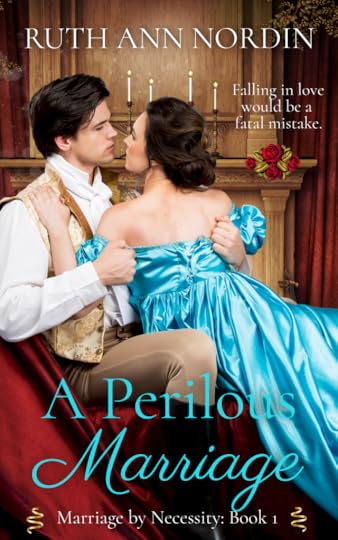
I’m not 100% happy with the description, so I’m going to see about tweaking it. I have read books and watched videos on how to make a good book description, and I am still not any good at it. It’s frustrating. Some authors have a gift for this kind of thing. I, unfortunately, am not one of them.
A Perilous Marriage is Book 1 in a brand new Regency series titled Marriage by Necessity. I originally introduced the hero in Kidnapping the Viscount. For quick reference, here’s the cover to help jog anyone’s memory in case they’re wondering what book I’m talking about:
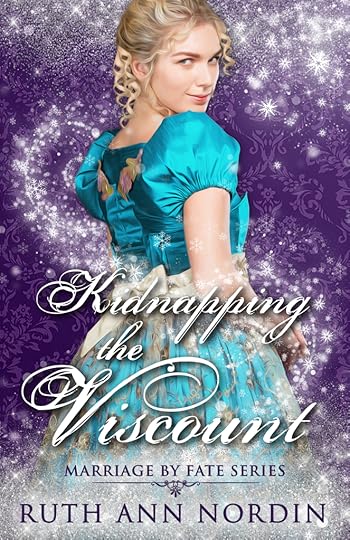
I’m the kind of person who needs a visual aid when trying to remember what someone is talking about.
Anyway, in Kidnapping the Viscount, Charles was the brother who kept unwittingly getting in the way of Heather and Gill as they were trying to find their way to their happy ending. (I got a kick out of how much her brother kept jumping to conclusions, so I thought he’d be perfect for a plot where the hero assumes the heroine killed his best friend.) A warning though, A Perilous Marriage is not a comedy. It’s a more serious book.
A Perilous Marriage is due out May 27. If you prefer to pre-order, here is where you can find it.
I actually finished An Earl In Time.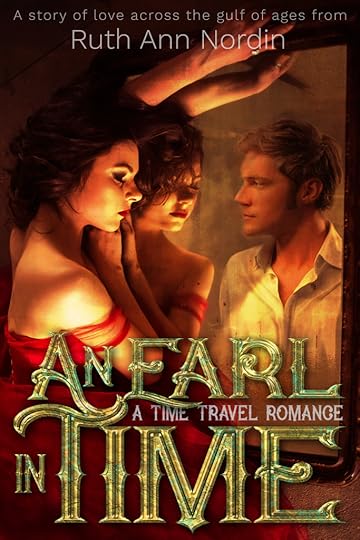
I didn’t think I was going to get done with the first draft until at least this summer, but once I received help from an author friend who excels in stuff like romance, magic, and gothic elements, it turned out to be a breeze to fix the problems that was bogging me down. I already knew the ending when I started this book, so that was easy to tackle.
I contacted the cover artist about changing the subtitle from “A Time Travel Romance” to “A Fairytale Romance”. While this book is a standalone, I want the ability to write other Regency Fairytale Romances in the future if other ideas happen to come to mind. This Regency has been placed in my regular Regency world. Toward the end of this book, I give a very brief mention of Lord Steinbeck (hero of The Earl’s Wallflower Bride who shows up here and there in other Regencies) and another later mention to Lord Clement (hero of The Earl’s Scandalous Wife who also shows up here and there in other Regencies). Keep in mind, these are just mentions. I couldn’t resist the pull to throw a couple of my other Regency characters into this book, especially since it fit in to do it.
It was fun to do something different within the world I enjoy. I find it helps to keep the creative wells going strong when I allow myself to dip my toes into other areas from time to time.
I started The Cursed Earl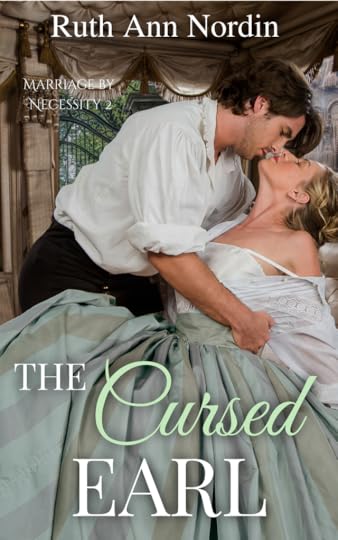
This is Book 2 in the Marriage by Necessity Series.
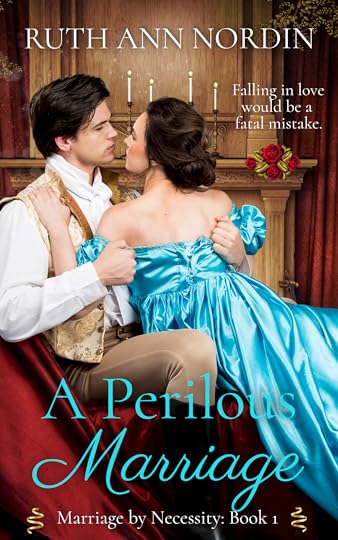

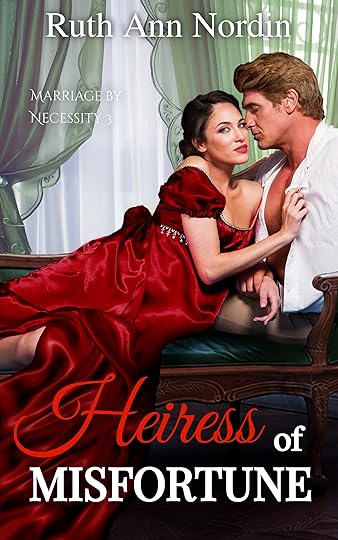
I suspect this one will be a comedy. The hero is new to the series, but he’s friends with the hero in A Perilous Marriage, and I introduce him in that book. I originally went with Eric, but then I thought I’d go with Algernon, which I established in A Perilous Marriage. Long story short, I thought Eris (based off a friend I know in real life) was too similar to Eric and could lead to come confusion. So he’s now referred to as Algernon.
Anyway, the heroine of The Cursed Earl is also introduced in A Perilous Marriage. She is Charles’ cousin who is in London to find a husband. Algernon is very superstitious, and he’s convinced he’ll die on his 25th birthday. Since his father and older brother are dead (they never were older than 25, hence is fear), he is tasked with the responsibility of having an heir. Reina is secretly in love with him, so she offers to help him with his duty to the crown.
I’ve only just started this, so I’m not really sure how things will go, but since Algernon is a member of White’s, I’m going to bring in Lord Edon and Mr. Christopher Robinson somehow. I’m looking forward to seeing them again.
While I’m discussing the Regencies, I want to mention this before I get to the historical westerns.I was browsing through the pre-made covers on The Book Cover Designer. I saw two pre-made covers that screamed, “Pick me, Ruth! Pick me!” I gave it a few days to think of what stories would go with the books because the only way I can justify buying a cover is if I have a story for it.
There were only two by this cover artist, and I want three for the series, so I’m getting the third book cover done soon.
This will be the Marriage by Obligation Series. I am going to tuck this series between the Marriage by Fate Series and the Marriage by Fairytale Series because the timeline for this series fits there.
As excited as I am about this series, I can’t start on it until after I finish the Marriage by Necessity Series, so we’re looking at October-November of this year before I start on Secret Admirer.
Here are the books:
Secret Admirer (Marriage by Obligation Series: Book 1)
Remember Cressica from The Perfect Duke?
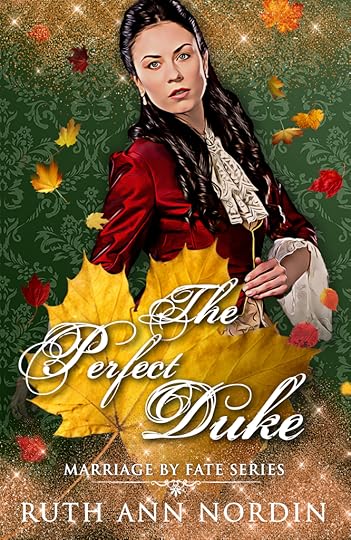
She was the oldest sister of Nicholas Lidgate, the Duke of Ravenshire. A couple of people mentioned wanting to read her book, and she’ll fit in perfectly in this book. Another thing that plays perfectly for this specific book is the ladies group that Cress (short for Cressica) just joined. The group is an elite social club, and it’s important that Cress marries the right gentleman.
Well, I thought it would be fun to do a heroine falling in love with a servant plot. I loosely approached these in Fairest of Them All and One Enchanted Evening, but the differences in social status between the hero and heroine didn’t factor into the plot. I can use that here because of that elite social group. What I need to do is figure out which male servant I want to be the hero.
Midnight Wedding (Marriage by Obligation Series: Book 2)
I haven’t thought over this one too much yet, but it’s a spin off of the idea for Kidnapping the Viscount, except in this case, the heroine has help from someone in her family in abducting a titled and wealthy gentleman with the intention of saving themselves from financial ruin. This one could go many ways, but this will fit the original idea I had for Kidnapping the Viscount. The original version of that book was a lot different than how it turned out to be.
So in this book, the hero is NOT going to be happy. The heroine is going to be incredibly naive as to just how precarious her position is when she goes through this kidnapping idea her idiot family member(s) had. I recently read a blog post about how ladies could be ruined and financially devastated so easily in this time period if the marriage was dissolved and she’s left with a child. Knowing all of this puts into perspective the reason why certain laws had to be put into place to protect women. The Regency era wasn’t friendly to women in a lot of respects.
The Duke’s Return (Marriage by Obligation Series: Book 3)I don’t have the cover yet, but I plan to introduce the hero in Book 1 of this series. He’s going to leave the heroine of The Duke’s Return on their wedding day for some reason (haven’t decided yet). He returns in The Duke’s Return, and I’ll see how things go from there.
Now for the historical westerns…
This is Book 3 in the Nebraska Prairie Series:
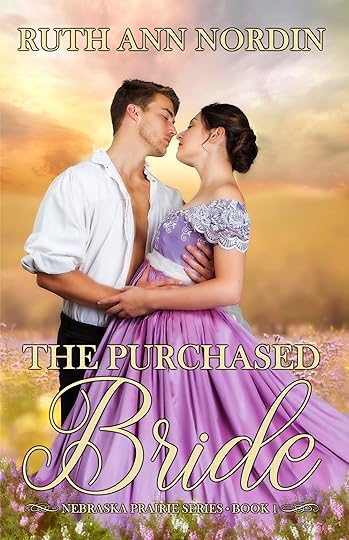

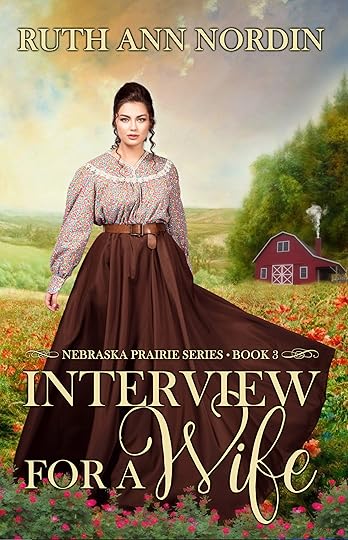
This was originally meant to be about 30,000 words, but I’m nearing 40,000 words and have more to go. I have a vague idea of how things are going to end. I have probably 5,000 more words to write in order to fully establish the relationship between the hero and heroine before I can come in for what will conclude the story.
At any rate, I should be able to have this out in July.
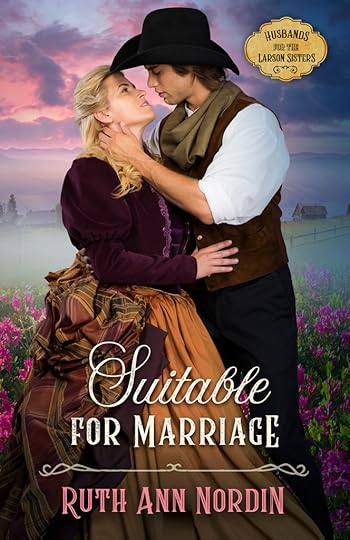
I haven’t made any progress in this one over the past month or so because I’ve been so focused on An Earl In Time. Now that I wrapped up An Earl In Time, I can get back to this. It is due out in November.
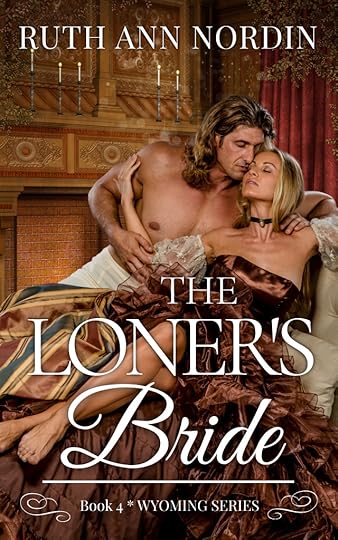
I haven’t forgotten this one. I plan to start on it when I finish Interview for a Wife. That should be (hopefully) in June. I’m looking forward to getting to this one since it’s okay for me to pair up Jeremiah with Katie.
April 14, 2021
Random Trivia About My Regencies Books
 ID 76715845 © Sheila Fitzgerald | Dreamstime.com
ID 76715845 © Sheila Fitzgerald | Dreamstime.comBack when I wrote my first Regency book (The Earl’s Inconvenient Wife), my intention was to only write one series. I had read some Regencies in the past and enjoyed them. Rose Gordon’s books happened to be among the ones I read right before I decided to take the plunge and write a Regency myself. As fate would have it, I ended up meeting Rose when she left comments on a blog and a forum I co-authored at the time. It wasn’t until we were emailing each other that I realized she wrote the books I had enjoyed. Long story short, we became friends. It was actually my enjoyment of Rose’s books that prompted me to write a Regency series. She helped me with the first series as I was struggling to get acquainted with the feel and flavor of Regency time period. If you haven’t read her books yet, I highly recommend them. Here’s her website.
Anyway, I originally titled the Marriage by Scandal Series as the “Regency Collection” because I meant to write a few books and then return to doing my historical westerns and contemporaries. Due to time constraints, I can’t devote my attention to more than two specific genres over the long run. So I figured once I was done with three or four books, I’d leave the Regency genre and that would be it. Well, I ended up falling in love with the cast of characters I had created in this Regency world, and I didn’t want to leave them. Lord Edon and Mr. Christopher Robinson are the two I enjoy the most, which is why I’m constantly bringing them back. Another reason I fell in love with my Regency world was that I could do stuff in this genre that I couldn’t do in historical westerns or contemporaries. Regencies are fun because the littlest thing is so “scandalous” that it can shock everyone, and a lot of times you can force a couple to marry over the most ridiculous thing. A lot of things that are scandalous in Regencies will only get a shrug in historical westerns or contemporaries. So I dropped the contemporaries and dedicated my time to historical westerns and Regencies.
All of the Regencies take place in the same world, which means I have the same cast of characters at my disposal at any one time, but I decided early on that I was going to do spin-off series instead of one really long one. I know some authors who have 20+ books in a series, but as a reader, I don’t like reading a series that long. My time is so constrained that I don’t get much reading in as it is. Because of this, I prefer 3-5 books if I read a series. I write books the way I want to read them. I also create series the way I want to read them. You’ll never see me do a super long series. I’ll do multiple series within the same world, though.
Lady Cadwalader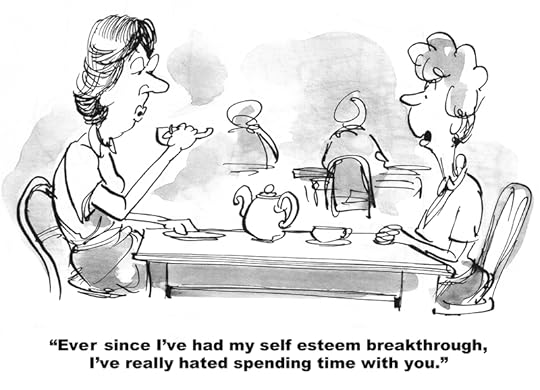 ID 65249898 © Andrewgenn | Dreamstime.com
ID 65249898 © Andrewgenn | Dreamstime.comIn my Regency world, Lady Cadwalader is the most influential person in London. Lord Cadwalader is a force to be reckoned with, too, but no one surpasses his wife. Reputations rise and fall based on her opinion. The only person who remains unscathed by her opinion is Lord Edon. No matter what he’s tried, he can’t ruin his reputation. This is because a lot of people secretly admire him for having the fortitude to disregard the rules of the Ton. So Lord Edon is just as influential as she is, but he’s on the opposite side of the spectrum in respectability, though that aspect of him has gone somewhat undercover due to his father-in-law keeping an eye on him. The threat of a fencing “accident” will do that to any gentleman.
Lady Cadwalader was never meant to be a permanent “mainstay” in my Regencies. I originally intended to dethrone her. She’s a snob of the highest sort, and I figured she should get what’s coming to her. That was why I came up with the group, Ladies of Grace. I introduced that group in the Marriage by Bargain Series with Book 1 (The Viscount’s Runaway Bride). I figured by the end of the series, Lady Eloise would replace Lady Cadwalader. That was why I inserted little things about the rivalry between the two ladies as the series went on. But as I continued the series, I realized I had grown to actually like Lady Cadwalader. Maybe it’s because she had time to grow on me, or maybe it’s because there is no better opponent to Lord Edon than Lady Cadwalader. Lady Eloise was definitely a snob, but she didn’t have the same flare than Lady Cadwalader did. In the end, I ended up removing Lady Eloise. The Marriage by Fate Series’ purpose was to bring about the fall and removal of Lady Eloise, once and for all.
Needless to say, Lady Cadwalader is very happy with the way things turned out.
“The” Book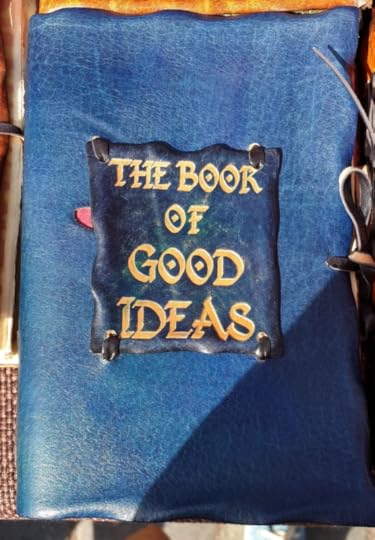 ID 153495775 © Irina Volkova | Dreamstime.com
ID 153495775 © Irina Volkova | Dreamstime.comWhen I introduced the book on how to pleasure a lady in the very first Regency I wrote (The Earl’s Inconvenient Wife), I didn’t expect it to make an appearance beyond the Marriage by Scandal Series. But then I found out some people liked the book, I decided to bring it back. It doesn’t show up in every book I write. I bring it up once in a while if I feel the hero will benefit from it. At first, I debated whether to reveal the author of this book or not, but then I thought I’d clear Lord Edon’s name since he hates how many people assume he’s the author. I figured if nothing else, the reader should know the truth. That was why I revealed the identity of the author in His Wicked Lady (Book 1 of the Marriage by Arrangement Series).
***
That’s all I can think of off the top of my head. If anyone has any questions about my Regencies, feel free to ask. I wouldn’t mind doing another blog post.
April 9, 2021
The Villain in Romance (A Storytelling Post)
After writing the post on villains, I started to think of why so many people assume that romance is nothing more than “porn for women”. And then the realization came to me. These people don’t understand how the basic elements of storytelling applies to romance. In their minds, romance is nothing more than the hero and heroine meeting, having lots of wild sex, and the book ending. (A lot of people also don’t realize that there are romances out there that don’t contain sex. But I’m not here to argue the fact that romance runs the range from squeaky clean to erotic.) I’m here to point out that romances actually come with a plot.
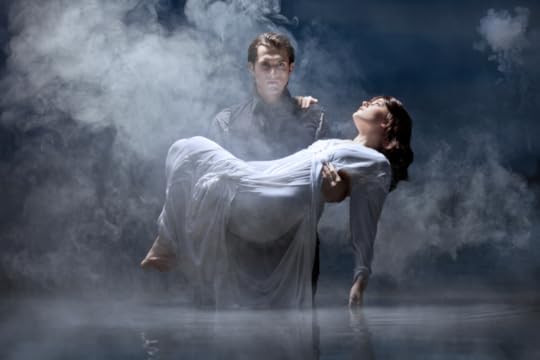 ID 23454316 © Teresa Yeh | Dreamstime.com
ID 23454316 © Teresa Yeh | Dreamstime.comI know. It’s hard for some to believe, but there is more to falling in love and getting to the happy ending than simply telling the reader, “They met, they fell in love, the end.”
The hero and heroine have a goal. The goal in romance is for the hero and heroine to end up happily together. While that sounds simple enough, it’s really not that simple because your villain (be it a person or thing) will present the conflict. There can be a parent, sibling, an ex, or other person who is actively working to come between the hero and heroine. I’ve done these, and they work well enough. They’re also self-explanatory. They’re very surface level villains.
The best villains for romance, in my opinion, are the ones in which the villain comes from within the hero or heroine. Most romances have these inner demons working within one or both characters. That’s why the villain often used in a romance is an emotional one.
Emotional villains come in many forms. I’ll give a few examples. 1. A hero might have to overcome the pain of a divorce in order to fall in love again. The villain in this case is the fear of going through pain again if the hero opens himself up to the heroine. 2. A wallflower/spinster heroine who doesn’t feel attractive has to overcome her insecurity in order to believe she deserves the love that the hero is offering. The villain in this case is her insecurity. 3. A hero might have been a complete jerk in the past and is working hard to redeem himself, but he struggles with the reality that he is now deserving of the heroine’s love. The villain in this case is the hero’s guilt. He must overcome it in order to accept that all has been forgiven and he is allowed to have the love he most desires. 4. A heroine desires independence but is afraid the hero will restrict her freedom if she were to fall in love with him. The villain in this case is the heroine’s fear that if she gives her heart to the hero, then she will sacrifice who she is. There are plenty of emotional villains out there to present a plot in a romance. It’s all in how that villain is used.
Let me illustrate how an emotional villain works in a romance by taking one of the examples I listed above. We’ll look at the wallflower/spinster heroine scenario.
What would be the best personality type in our hero? You’d want someone who is able to recognize what makes a lady superficial. Our hero is seeking someone he can have a genuine conversation with. He wants someone who has inner beauty that others miss. Since the villain in this story is the heroine’s insecurity, we need obstacles that target her insecurity. The obstacles are there to keep her insecure. Anything that makes her feel insecure will add to the conflict between her and the hero. Perhaps one of the hero’s family members finds her lacking and makes her feel like the hero could do way better. Or maybe the hero ends up stuck with some task at a job that keeps him gone a lot, and she begins to wonder if he’s secretly with another lady (one he finds much more desirable than her). In both cases, her insecurity has been reinforced. Regardless of the obstacles, she is going to have to overcome them until the end of the book where she finally comes to realize that the hero truly does love her and sees her as the most desirable lady who’s ever lived. The happy ending comes when she overcomes that war with insecurity, and since this is a romance, her ability to overcome her insecurity is due to the hero’s love. Without the hero, she is unable to reach the point where she’s confident with herself.
A final word: my advice is to avoid the overused tactics of endless cycles of misunderstandings and the endless cycles of interruptions. I see these used a lot in romance, and it drives me crazy. The hero and heroine should be mature enough to sit down and have a conversation, and they should be allowed to do it without someone always coming in to interrupt them. Use these things sparingly. It’s far more effective to get more creative when coming up with obstacles to throw at the hero or heroine.
April 6, 2021
The Villain (A Storytelling Post)
While going through the administrative part of this blog, I saw that someone out there was searching for information about villains, and I thought this sounded like a fun topic to discuss.
So, today, I’m going to discuss the villain. In essence, a villain is the person or thing that stands in the hero’s way.
 ID 204986041 © Paulus Rusyanto | Dreamstime.com
ID 204986041 © Paulus Rusyanto | Dreamstime.comWhen we begin the story, we’re introduced to the hero, and usually, we’re given the hero’s normal world. Then, pretty soon, we should come to something that starts the hero on his journey. This is the hero’s goal. Regardless of the genre, the hero has to have a goal in order to give the book a plot. And in order for the story to be interesting, someone or something has to stand in the hero’s way of achieving this goal.
That someone or something is the villain. Some people call this the nemesis. Typically, we think of a villain as a person or a creature, but it can be anything that produces the source of conflict in the story. It can be an animal, such as a genetically modified dog that is hunting a group of hikers. It can be weather, such as a tornado that is making it hard for a father to get to his child. It can be a car that has a personality of its own and doesn’t want the hero to end up with the girl of his dreams. There are many things the villain can be. It can even be something the hero must overcome within himself. This “something” can be mental, emotional, physical, or spiritual. Off the top of my head, an example of a mental villain might be someone with a memory loss having to figure out the pieces of a puzzle in order to prove he didn’t kill his wife. Emotionally, the villain could be the pain someone went through in a divorce that is preventing the hero from falling in love again.
So really, the villain is a pretty broad range of things. The writer’s task is to pair the right villain up with the hero’s greatest weakness. The villain has to present something that could be the undoing of the hero. The higher the stakes, the more exciting the story is. You can’t just throw any obstacle at the hero. The obstacle has to target the hero’s weakness.
In real life, everyone faces problems. Depending on our personalities, we’ll deal with these problems differently. Someone who isn’t all that concerned with finances is going to shrug off a huge repair bill, but someone who is concerned with finances is going to freak out when confronted with an unexpected bill that throws them off of their carefully laid out budgeting plans. Or let’s say we have an issue with faith. Let’s say that someone claiming to be a “prophet of God” insists that Event A is going to happen, but it never comes to pass. Someone who doesn’t believe in God isn’t going to be impacted by this. But someone who does believe in God might be confronted with a crisis of faith where he has to carefully evaluate what he believes in and why.
So when you’re looking at the kind of villain to give your hero, it’s necessary to know your hero’s vulnerable area. This villain is only effective if he/it can punch a hole right into that vulnerable spot. You can’t just give the hero a series of “problems” and say something is happening. There might be something happening, but it’s not the least bit interesting if those problems are just “meh” to our hero. You want to concentrate on one major problem the hero needs to overcome because this one problem is the plot of the book. You can put in smaller obstacles along the way that propel our hero forward to the conclusion of resolving the major problem. But you have to give an obstacle to the hero in every single chapter. You need some chapters where things calm down. The hero (and the reader) needs time to decompress from a high stress event. No one can run on adrenaline all the time.
Storytelling is like a range of hills. The valleys are your low tension events. The peaks of the hills are the high tension events. A short story will only have one hill. A long story will have a series of them. During the valleys, the hero is given time to rest while the villain is working on the next obstacle. Each obstacle should work toward increasing the conflict. It’s like turning the heat up in a pot. The beginning of the story starts at a simmer, the middle is where things are starting boil, and the end is where its boiling. The very end of the story is the climax, and this is the largest hill. It is where the final battle between the hero and villain takes place. If the hero wins, the villain is conquered once and for all. This is the happy ending. If the villain wins, the hero is defeated once and for all. The hero will never reach his goal. It’s game over. This is the sad ending.
One thing I want to note about sad endings is that they are not always bad. Something a sad ending is actually the most effective way to end a story. It can be the twist that is needed to make the biggest impact. The writer’s goal in any story is to give the most effective ending possible. Romance is the only genre that you must have a happy ending for. The couple must end up together. If the couple doesn’t end up together, you have a love story. It is not a romance. I have yet to read a fantasy that has a sad ending, so this might be a rule in fantasy, too. But other genres seem to be more flexible in allowing the villain to win.
April 2, 2021
An Earl In Time is a Dark Fairytale Romance (A Warning to Those Who Don’t Like Dark Fiction)
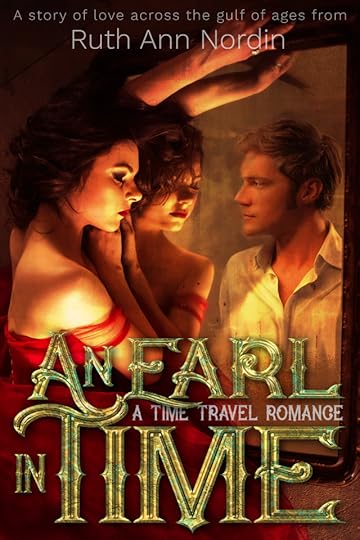
So as I writing today, a scene came up that took a very dark turn. This was not something I had anticipated when I started this book, and it wasn’t something I thought would happen when I got the cover. The man and woman still fit. The title still fits.
But the subtitle is not really an accurate portrayal of things. I mean, there is a time travel aspect. So technically, it’s okay there. The thing is that this book is far darker than I expected. Think of the original fairy tales (not the cute Disney ones). Think of fairy tales where Rumpelstiltskin wanted the woman’s firstborn child for helping her turn hay into gold, where the witch lured Hansel and Gretel with a house made of candy in hopes that she would get to eat them, or a wolf ate a girl’s grandmother and then tried to eat her, too. When I was a little kid, Little Red Riding Hood gave me nightmares. These are dark fairy tales. They have dark elements in them. In the end, however, good won out, and that’s how things will play out in this book as well.
When I wrote the Marriage by Fairytale Series, I got a few comments about how gruesome and violent The Wedding Pact and The Duke’s Secluded Bride were.
One beta reader was so shocked that she said she couldn’t believe I could write a villain as terrible as the one I had in The Duke’s Secluded Bride and write someone as wonderful as Dave Larson in Eye of the Beholder. (I actually took that as a compliment since I like knowing I can run the spectrum on heroes and villains.)
Mostly, though, I received comments from people who said that they never want to read anything like The Wedding Pact and The Duke’s Secluded Bride ever again. They asked me to let them know if I was going to write a book similar to those so that they could avoid them. Since I said I would, this post is the warning. If you didn’t like The Wedding Pact or The Duke’s Secluded Bride, skip An Earl In Time. It’s actually worse than those.
The dark elements involve a curse and a villain who was willing to sacrifice her own baby for eternal youth (so you can imagine what she’s willing to do to the hero and heroine). Though to be fair, the dark stuff comes in toward the last 1/4 of the book, which is what I’m working on right now. I don’t start out knee-deep in dark territory, though I do hint at it through the use of “a bloody legend” and the fact that the heroine gets isolated from the rest of the world.
The story starts out in our contemporary time where the heroine inherits an estate that she is unable to leave or sell. She comes upon our hero who is stuck in a parallel reality (due to magic), except he’s been living out the same day over and over (June 17, 1817) for two centuries. It’s only when the heroine steps into his time that the hero is able to move forward in time again. The heroine is now in 1817 with him and is unable to return to her time (nor does she really want to because the hero is handsome and pleasant to be around). Things evolve from there as they try to figure out why they can’t leave the property, and, of course, they fall in love, get married, and the book becomes a steamy romance.
As with quite a few fairy tales, I’ve brought in the element of fantasy where magic is at play. I’ve been advised by fantasy writes to make sure my magic comes with rules. I’ve been trying to watch these rules so I don’t break them, but I have learned the benefit of rules is to give the hero and heroine a high-stakes obstacle to overcome. But there is a flip side. Since this is a romance, I’ve gone the route of “true love” having its own magic, and this will be an obstacle to the villain. As a kid, I’ve always like the “true love” element of fairy tales, so I wanted to incorporate it into this book.
I don’t know how many people I just lost by writing this post, but I don’t want anyone reading this if it’s not your cup of tea. I’ll link back to this post in future as needed just in case someone missed it this time. That way, I don’t repeat myself like crazy for the rest of the year. I’m hoping to get this book out in November or December, though I guess it would make a good Halloween read for people who like romance and some gothic fiction. So maybe I’ll make it an October release.
March 28, 2021
Perfectly Matched is Now Available!
This is the second book for Tom and Jessica Larson’s daughters. 

Here are the books in the Husbands for the Larson Sisters Series:
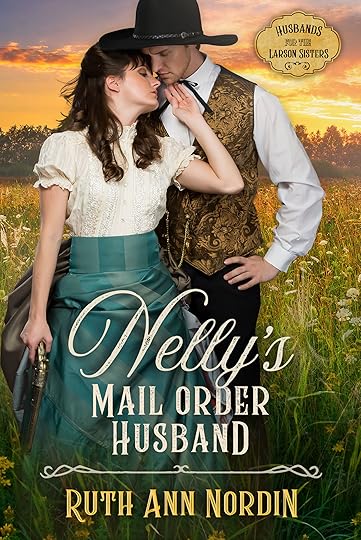
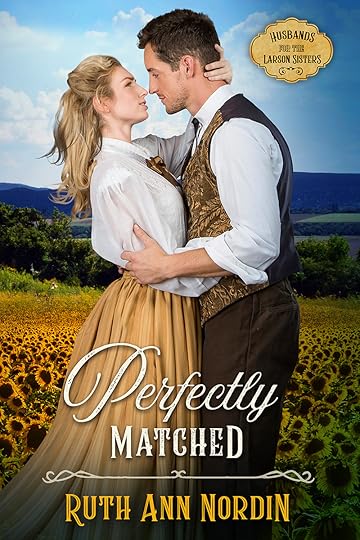
 (Book 4)
(Book 4)
It’s going to contain four books in all, but I don’t have the title or plot idea yet for Book 4.
Here’s the description:
Jim Griffin is in trouble. The moment he arrives in Omaha looking for a place to stay, Patricia and Erin Larson have decided he will marry one of them. And the longer he’s a guest in their home, the louder those wedding bells are ringing!
Their father isn’t as excited by the prospect of an upcoming marriage as they are, and he does everything he can to discourage Jim from getting too close to them. Meanwhile, their mother has other plans and is more than happy to look for ways to get him to spend time with each of them.
This cute, sweet, and clean romantic comedy takes a look an overwhelmed bachelor who is at the mercy of two sisters who are determined to get a husband.
Here’s where you can find it:
March 18, 2021
What To Do When Your Series is a Dud (A Post For Authors)
As authors, we write the best stories we can. Regardless of whether we’re writing for passion or writing to market, the goal is to produce our best work. And while we might think that what we’re writing is our best, unfortunately, a lack of sales and negative reviews tell us it’s not. If you’ve written enough books, you know what I’m talking about. Every author, at some point in their writing career, will face a book or a series that, for whatever reason, didn’t meet expectations. For the sake of this post, I’m going to talk directly about series, but this applies to standalone books, too.
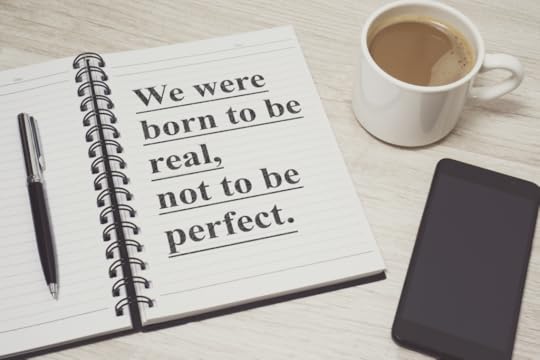 ID 120499759 © Constantine Johnny | Dreamstime.com
ID 120499759 © Constantine Johnny | Dreamstime.comThere are several reasons why a series fails to meet up to our expectations. It could be that we rushed the series before we gave it enough time to percolate in our minds. We might feel pressured by a deadline or have some readers who are anxious for the books, so we do whatever we can to get them out there as soon as possible. Or maybe we happen to be at a difficult period in our lives where it’s hard to give our everything to our work. Anything that puts us under stress (whether it be loved ones, financial burdens, or even our health) can affect our ability to focus clearly when we’re writing. Or maybe what we’re writing doesn’t meet a defined set of expectations for a particular genre. Whether we want to hear it or not, most readers go into a series with a set of expectations for the genre they like to read. If we don’t meet those expectations, we often disappoint them. That doesn’t mean the series is bad; it just means that the series didn’t satisfy the list of things they wanted to read when they picked up the series.
Most series, thankfully, meet up to our expectations, and every series we put out there will stay published as long as two things are accomplished. These two things are good sales or good reviews. You don’t need both of these. You just need one. If you don’t have one of these, then it’s really hard to convince yourself the series is worth keeping up.
This leads me to the topic of this post. What if the sales AND reviews on your series suck? What are your options?1. Take the series down.
I’ve done this to some books in the past. What’s the point in having something up there that obviously disappoints a lot of people? We already take a hit from the negative comments that come in our emails, blogs, social media messages, and the like. We are aware that our books don’t please everyone. Having the books stay up there where they continue to get slammed while not making money off of them gives us no incentive to keep them published. In fact, it often seems like those books are making us look worse.
We only get one book to make a good impression. Readers don’t usually purchase another book unless they like the first one they pick up, and we have no control over which book they will choose to read first. Making sure each book is liked by the majority of people who read them is in our best interest. We don’t aim to please everyone; we just aim to please the people who read our genre.
There’s nothing wrong with unpublishing anything. Contrary to what some will say, you don’t have to keep up everything you’ve ever done.
2. Rewrite the series (or the weak books in the series) and republish it.
If you love the series, this is worth pursuing. But this has to be a series that you are absolutely passionate about. It’s worthless if you’re just writing to market. If you’re writing to market, just move on to another idea because there’s a chance this rewrite might not pay off.
Here’s what I do when I’m not sure if a book is worth republishing or not. After I’ve unpublished the book, I work on other books. I wait a year or two. If that book keeps poking at me to put it back up, I’ll rewrite it and republish it. If I have no such inkling to get it out there ever again, I let it go. This is a long-term approach, but I’ve never regretted doing a full rewrite if the book kept prodding me to work on it.
Now, some series won’t require extensive rewrites on all of the books. There might be one or two that needs work. I’ve done it both ways. If you believe in your series and totally love it but have one weak book, it might be worth taking that weak book and giving it an overhaul. But only you can determine if this series is worth it because you’re the one who is emotionally invested in it. It’s highly unlikely that a reader is going to love your books as much as you do.
Never put in this work and effort for an “eh” series. In my experience, it hasn’t been worth it. I’ve made this mistake early on, and I wasted half a year on this fruitless endeavor. In the end, I unpublished it all over again, and this time I put it away for good. I haven’t missed those books at all.
3. Write a brand new series with the same ideas or characters.
This is kind of like the rewrite, but it’s not. You’re basically starting from scratch. Everything can be different. Sometimes you can fall in love with your characters and not want to unpublish “them”. If that’s the case, you can bring them back and put them in a different storyline. Give them different conflicts to overcome. And if, let’s say, you didn’t like the characters, create new ones. Then put them in the same idea you had before. You’d be surprised how much a story changes when you bring in different characters. Maybe these characters will make your original story idea stronger.
One exercise to try (and I do this, too) is to work on a story/series in your mind for a few weeks. Don’t write anything out. Just let things evolve in the mind. Explore the different angles you can try. See what would happen if certain things were changed. Then decide if any of those scenarios spark your interest. If something deep within gets excited by one of the avenues you mulled over, then it’s worth a closer look.

